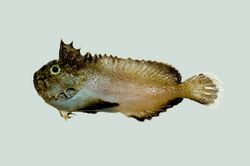Biology:Erisphex
| Erisphex | |
|---|---|

| |
| Erisphex aniarus | |
| Scientific classification | |
| Kingdom: | Animalia |
| Phylum: | Chordata |
| Class: | Actinopterygii |
| Order: | Scorpaeniformes |
| Family: | Aploactinidae |
| Genus: | Erisphex D. S. Jordan & Starks, 1904 |
| Type species | |
| Cocotropus pottii Steindachner, 1896[1]
| |
| Synonyms[1] | |
| |
Erisphex is a genus of marine ray-finned fish, velvetfishes belonging to the family Aploactinidae. The genus is found in the Indian and western Pacific oceans.
Taxonomy
Erisphex was originally described as a genus in 1904 by the American ichthyologists David Starr Jordan and Edwin Chapin Starks with Cocotropus pottsii, which had been first formally described in 1896 from Kobe in Japan by Franz Steindachner, designated as the type species.[1][2] The genus Erisphex is classified within the family Aploactinidae in the suborder Scorpaenoidei within the order Scorpaeniformes,[3] although this family is also treated as a subfamily of the stonefish family Synanceiidae[4][5] within the Scorpaenoidei, which in turn is treated as a superfamily within the order Perciformes.[6] The name of the genus, Erisphex is a compound of eri, meaning “very”, and sphex, which means “wasp”, this was not explained by Jordan and Starksbut is presumed to be an allusion to the venom bearing spines in the fins of these fishes.[7]
Species
There are currently four recognized species in this genus:[8]
- Erisphex aniarus (J. M. Thomson, 1967) (Dark-finned velvetfish)
- Erisphex philippinus (Fowler, 1938)
- Erisphex pottii (Steindachner, 1896)
- Erisphex simplex L. C. Chen, 1981
Characteristics
Erisphex is distinguished from other velvetfishes by having a pair of large spines ion the lacrimal bone, the second spine is large and extends down over the maxilla. They also have 4 sharp spines on the preoperculum to the front of the base of the pelvic fins.[9] These are small fishes, the largest species is E, pottii which reaches a maximum total length of 12.1 cm (4.8 in)>[8]
Distribution
Erisphex velvetfishes are found in the eastern Indian and Western Pacific Oceans as far east as New Caledonia.[2]
Venom
Erisphex velvet fishes have venom glands in the base of their anal fin spine.[10]
References
- ↑ 1.0 1.1 1.2 Eschmeyer, William N.; Fricke, Ron; van der Laan, Richard, eds. "Genera in the family Aploactininae". California Academy of Sciences. http://researcharchive.calacademy.org/research/ichthyology/catalog/fishcatget.asp?tbl=genus&family=Aploactininae.
- ↑ 2.0 2.1 Eschmeyer, William N.; Fricke, Ron; van der Laan, Richard, eds. "Species in the genus Eirisphex". California Academy of Sciences. http://researcharchive.calacademy.org/research/ichthyology/catalog/fishcatget.asp?tbl=species&genus=Eirisphex.
- ↑ J. S. Nelson; T. C. Grande; M. V. H. Wilson (2016). Fishes of the World (5th ed.). Wiley. pp. 468–475. ISBN 978-1-118-34233-6. https://sites.google.com/site/fotw5th/.
- ↑ Smith, W. Leo; Smith, Elizabeth; Richardson, Clara (February 2018). "Phylogeny and Taxonomy of Flatheads, Scorpionfishes, Sea Robins, and Stonefishes (Percomorpha: Scorpaeniformes) and the Evolution of the Lachrymal Saber". Copeia 106 (1): 94–119. doi:10.1643/CG-17-669. https://www.copeiajournal.org/copeia-bjah/ofcg-17-669yt497804km.
- ↑ Willingham, AJ (13 April 2018). "Stonefish are already scary, and now scientists have found they have switchblades in their heads". CNN. https://www.cnn.com/2018/04/12/health/stonefish-switchblade-lachrymal-saber-trnd/index.html.
- ↑ Ricardo Betancur-R; Edward O. Wiley; Gloria Arratia et al. (2017). "Phylogenetic classification of bony fishes". BMC Evolutionary Biology 17 (162): 162. doi:10.1186/s12862-017-0958-3. PMID 28683774.
- ↑ Christopher Scharpf; Kenneth J. Lazara, eds (10 March 2022). "Order Perciformes (Part 10): Suborder Scorpaenoidei: Families Apistidae, Tetrarogidae, Synanceiidae, Aploacrinidae, Perryenidae, Eschmeyeridae, Pataecidae, Gnathanacanthidae, Congiopodidae and Zanclorhynchidae". The ETYFish Project Fish Name Etymology Database. Christopher Scharpf and Kenneth J. Lazara. https://etyfish.org/perciformes10/.
- ↑ 8.0 8.1 Froese, Rainer and Pauly, Daniel, eds. (2022). Species of Erisphex in FishBase. February 2022 version.
- ↑ Poss, S.G. (1999). "Aploactinidae. Velvetfishes". FAO species identification guide for fishery purposes. The living marine resources of the Western Central Pacific. Vol. 4. Bony fishes part 2 (Mugilidae to Carangidae). Rome, FAO. pp. 2354–2358. ISBN 92-5-104301-9. https://www.fao.org/3/x2400e/x2400e00.htm.
- ↑ Stuart G. Poss; William N. Eschmeyer (1978). "Two New Australian Velvetfishes genus Paraploactis Scorpaeniformes Aploactinidae with a revision of the genus and comments on the genera and species of the Aploactinidae". Proceedings of the California Academy of Sciences. 4 41 (18): 401–426. https://www.biodiversitylibrary.org/page/15691839#page/428/mode/1up.
Wikidata ☰ Q1592765 entry
 |
